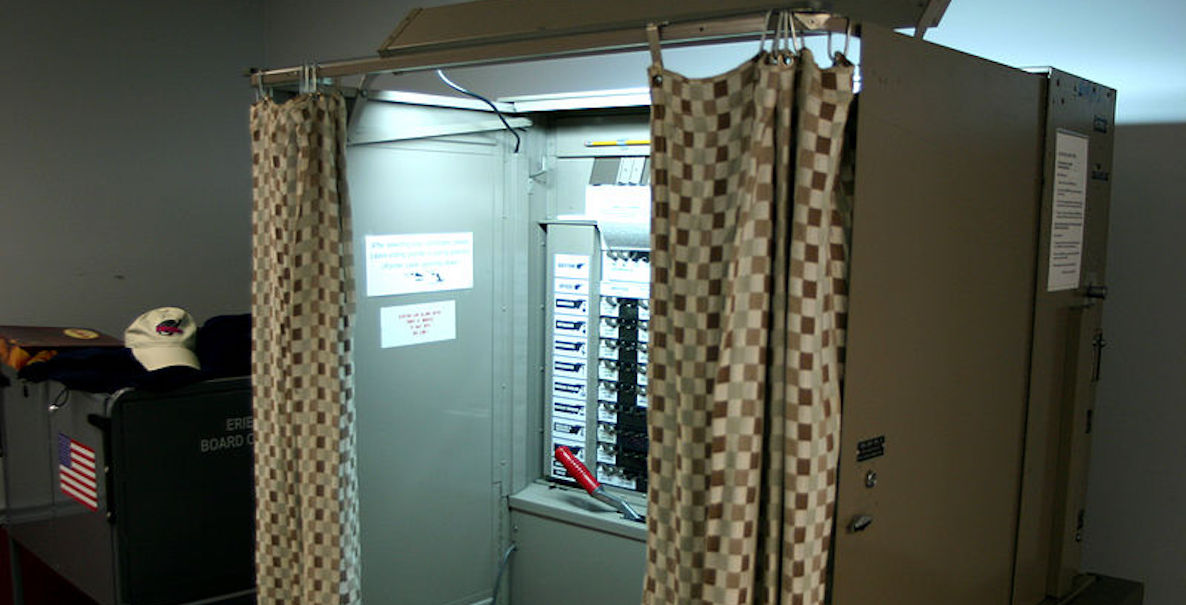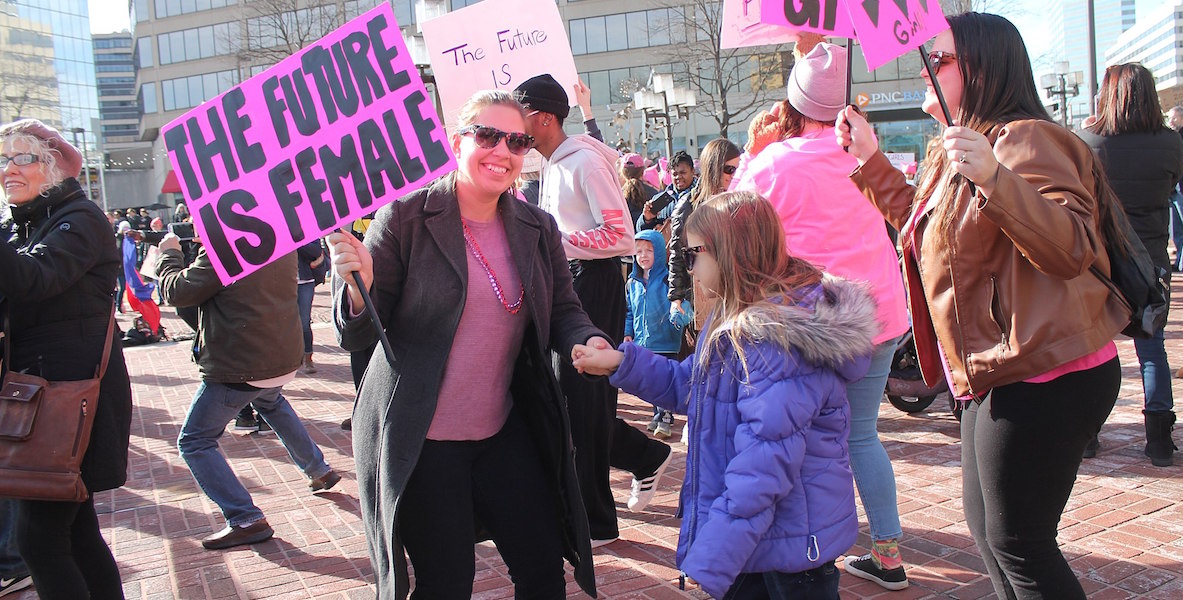It was the spring of 1978 when Bernie Enright approached Madeleine Dean with a fairly odd suggestion. He was the Democratic commissioner in Ward 12, and she had just finished her freshman year of college at La Salle as an Education-English major.

Prefer the audio version of this story? Listen to this article in CitizenCast below:
Audio Player
Enright knew her because of her friendship with his daughter. He asked if she wanted to run for committee person in Ward 13. Dean had not worked in student government at La Salle or in high school. Newly 18, she actually hadn’t even registered to vote yet. But Dean took Enright’s advice and started campaigning.

She mimeographed a flyer with an illustration of a giant sign and the caption “Notice! Pull lever 35A”—her ballot position—and typed a few paragraphs for a letter she gave to registered Democrats in the area. In the letter she explained she was interested in government and wanted to learn how it worked.
“Getting elected is the first step,” she wrote, “and I would appreciate your support.”
The election was on May 16 that year. Dean won. She beat a middle-aged man.
This year Dean, who’s been a State Rep for Abington and Upper Dublin townships in Montgomery County since 2012, is running for the 4th District Congressional seat. Another middle-aged man with a more prominent name, Joe Hoeffel, stands as the greatest obstacle for her and another woman candidate, former CeaseFire PA Executive Director Shira Goodman. A fourth contender, Mary Jo Daley, left the race a few weeks ago, releasing a statement saying she believed she would be “facing a bitter and costly campaign that could very well lead to blowing a rare occasion to elect a strong, progressive woman from Pennsylvania to Congress.”
Candidates like Dean, Goodman, Ahmad and Lunkheimer aren’t refreshing simply because they’re women. They’ve come into politics from a background separate from traditional routes to power, i.e. backroom deals with ward leaders or long stints in another political position.
Nationally, 527 women are running for U.S. House and Senate races this year, the highest number in history. Pennsylvania, which has no women in Congress or at the highest state positions and scant minorities, could see a boost from women and from men coming from nontraditional political backgrounds. The total number of women running for governor, lieutenant governor or congressional seats in the Philadelphia area this year is 18 and total number of people of color is 12. Those totals in total in 2014 were eight and three for the same categories.
Among those candidates are activists, engineers and a molecular biologist. Thanks to the new district maps, pushback against Trump and the #MeToo movement, there’s real competition, real diversity.
But takeovers don’t happen easily. For every Madeleine Dean or Shira Goodman, there’s a Joe Hoeffel, whose name recognition or connection to a powerful group could stunt the makeover Philadelphia and Pennsylvania need.

Dean actually used to work for Hoeffel. At 19, she was the volunteer coordinator on one of his state Representative campaigns. She knocked on doors and met PJ Cunnane, who she would marry a few years later (The Philly suburban political world gets even smaller: It was PJ Cunnane’s father who convinced Bernie Enright—who convinced Dean to run for that committee seat—to get into politics).
“I always say Joe Hoeffel did one thing very, very good—introduced me to my husband,” Dean says.
After college, aside from volunteering here and there, she left the political sphere. Dean worked as an attorney for many years, leading the Philadelphia Trial Lawyers and starting her own firm. Then she taught English as a professor at La Salle University. Around 2011, her kids nearing high school, Dean began wading back into politics.
As a state legislator in 2012, Dean spoke out against a bill being considered in front of the House. Speaker Sam Smith signaled to her that she shouldn’t have said anything, given her status as a freshman lawmaker. He told her she was supposed to sit and listen for a while.
While taking classes at Penn’s Fels Institute of Government, she heard from a county Democratic leader an Abington Township Commission seat was opening. It happened to be the same week former Arizona Congresswoman Gabby Giffords was shot at a campaign event. To Dean, Giffords personified the sacrifices public servants made, and the incident helped sway her to run. A year later, with Josh Shapiro leaving his PA House seat for the Montgomery County Commissioners, she ran successfully for the 153rd legislative district.
Lynn Yeakel, the senate candidate who nearly toppled Arlen Specter in 1992 and founder and president of the women’s equality initiative Vision 2020, says women are more likely than men to become involved in politics because they’re inspired by a cause.
VOTEDo Something
Goodman’s intentions in running are comparable to Dean’s: She was motivated by the election of Trump and the gun control she’s been fighting for with CeaseFire PA.
Val Arkoosh, chair of the Montgomery County Board of Commissioners, has accused Hoeffel of less clear intentions in a Facebook video where she called on him to withdraw.
“I get asked every day why Joe is running,” she said in the video. “I don’t have a good answer. But I will tell you that Joe seems to really like to run for office but not necessarily govern once he gets there.”

At least one of this year’s political newcomers is primed to win a Congressional seat. Chrissy Houlahan, a former teacher and chief operating officer of And1, is the lone Democrat in the 6th District, where Ryan Costello, the incumbent Republican, announced his retirement. Most of the others must find a way to defeat someone more familiar.
Dean may have six years as a State Rep. and Goodman experience working with Democrats and Republicans in Harrisburg on a hot-button issue, but Hoeffel has been Montgomery County’s Congressman before, as well as its State Rep. and as a commissioner.
In the 5th District, six of the 10 candidates for Congress are women, including Mary Gay Scanlon and Ashley Lunkenheimer, who are considered major contenders. Combined, none of them may attain the publicity candidate Richard Lazer is getting because of his ties with Johnny Doc’s Local 98. The union has invested at least $300,000, and more likely $600,000, in direct spending and a new PAC created to benefit help Lazer, who was Mayor Jim Kenney’s labor liaison. His name is already all over signs along Columbus Boulevard, and it will certainly appear on sample ballots handed out by union members on election day.
Takeovers don’t happen easily. For every Madeleine Dean or Shira Goodman, there’s a Joe Hoeffel, whose name recognition or connection to a powerful group could stunt the makeover Philadelphia and Pennsylvania need.
The Lieutenant Governor Democratic nomination could be won by Nina Ahmad, a former Kenney staffer who became a molecular biologist here after migrating from Bangladesh, or John Fetterman, a Western Pennsylvania mayor extolling the virtues of Bernie Sanders progressivism before it was cool. Both of them have sizable war chests, enough to spend six figures on TV ads.
And yet troubled incumbent Mike Stack still looms. The State Democratic party didn’t endorse anyone for the position, but a majority of Pennsylvania’s Democratic state Senators endorsed Stack in his re-election bid before all the candidates had filed. They did this even though he has been accused of using public money for questionable expenses and mistreating state police, showcasing the typical Pennsylvania mentality toward incumbents of “do anything except a commit federal crime and we’ll endorse you (and maybe we still will if you haven’t been convicted just yet).”
Tell your friends it's time to runShe Should Run
The signs and sample ballots and the name recognition carry great importance in any election. In a mid-term, they could be a greater factor because of expected poor turnout. In 2014, the last gubernatorial primary, turnout for all of Philadelphia was 19 percent. For voters between the ages of 18-to-34, those more likely favor a shakeup of the status quo, turnout was a beyond-abysmal 7 percent.
“I just worry about the voter turnout in the primaries because people just don’t seem to pay attention,” Yeakel says.

At some point during her first few weeks as a state legislator in 2012, Dean spoke out against a bill being considered in front of the House. Speaker Sam Smith signaled to her that she shouldn’t have said anything, given her status as a freshman lawmaker. He told her she was supposed to sit and listen for a while. Others, she said, reiterated Smith’s opinion and added that freshman women especially didn’t get to speak.
Stories from Mark DentRead More
The memory is a prime example of Pennsylvania’s old guard politics. Candidates like Dean, Goodman, Ahmad and Lunkheimer aren’t refreshing simply because they’re women. They’ve come into politics from a background separate from traditional routes to power, i.e. backroom deals with ward leaders or long stints in another political position.
The year of women could finally bring some gender balance among Pennsylvania’s foremost leaders—and much more.
“We rub up against some old indoctrinated ways,” Dean says. “I believe that’s changing with this year’s election.”
Photo via Wikimedia Commons





